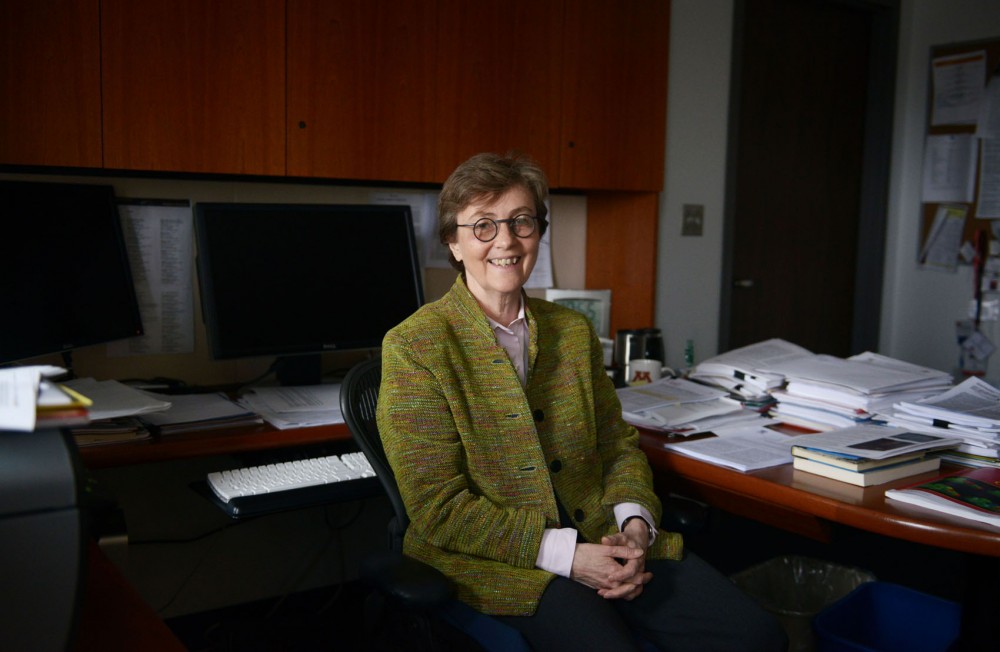For Gunda Georg, writing scientific papers on a weekend is fun. It’s often the only time she has for that part of her job because the week is full of her other responsibilities.
The University of Minnesota College of Pharmacy professor loves what she does, and her colleagues say that’s what keeps her so dedicated to her many roles. Georg is the director of the Institute for Therapeutics Discovery and Development, head of the Department of Medicinal Chemistry and co-editor-in-chief of the Journal of Medicinal Chemistry.
“I enjoy what I’m doing,” Georg said, “so even if I’m working on the weekends, it doesn’t feel like work.”
Georg and colleagues from the University and the University of Kansas recently announced a potential male birth control pill, which the Food and Drug Administration will begin reviewing this summer.
The American Association of Colleges of Pharmacy announced last month it will honor Georg with a research award this July.
Georg holds several patents, has published nearly 200 research articles and has mentored more than 110 students, but she insists it’s not that much.
“It’s a bit of a juggling act,” she said.
Rebecca Cuellar, research assistant professor, said she’s “astounded” by how much Georg gets done every day.
“They say that people all only have 24 hours,” she said, “but sometimes I’m convinced that she’s made some sort of deal and gotten more.”
Juggling roles at the U
Every morning, Georg reads and reviews articles for the Journal of Medicinal Chemistry — the premier publication for the field — of which she became co-editor-in-chief in 2011.
Then, depending on the day, she could go solve problems with her lab group, grab lunch with faculty members or organize a seminar for the department.
She co-founded the Institute for Therapeutics Discovery and Development when she came to the University in 2007 to translate discoveries in the lab into pharmaceutical realities.
Georg had nearly $700,000 in grant money on the books for the 2012 fiscal year alone, according to Office of the Vice President for Research data.
Since her arrival, the Department of Medicinal Chemistry has more than doubled the amount of grant funding it receives from $1.8 million in 2007 to $4.2 million in 2012 — partially due to Georg’s own grant money, hiring new faculty members and fostering research in the department.
The ITDD lab is large and employs many people. More than 40 faculty, staff and students work in its 20,000 square feet developing drug applications for cancer, Alzheimer’s and male contraceptives.
Cuellar came to the ITDD as a post-doctoral researcher and said she has stayed because of Georg’s guidance.
“She is so well respected in her field,” Cuellar said, “but she is very down-to-earth and very easy to talk to, very approachable.”
Vadim Gurvich, ITDD associate director, said Georg’s collaborative leadership style and hardworking attitude inspire students to work as hard as she does.
Jill Kyzer, a third-year graduate student, said independence is essential for working in Georg’s lab.
“Dr. Georg is very hands-off,” she said. “She is obviously very busy … so we’re given free rein on our projects.”
But if members of the group are stuck on a project, Kyzer said Georg always has advice on how to fix it.
Georg started working on developing a viable male birth control pill when she was at the University of Kansas in 2001.
The National Institutes of Health called for grant proposals to fund a male contraceptive project. Georg said she thought it was interesting.
“As women, in particular, I think we are very concerned about birth control,” she said. “Certainly it would be good if males shared a little bit more of that, if they had the equivalent to the female pill.”
Since then, Georg and her colleagues in Kansas have patented the drug Gamendazole, which has worked to block sperm after just one dosage in animal models.
Georg said the drug may be the first non-hormonal male birth control pill under FDA review. But its road to approval and distribution is long, she said, because the pill would have to be free of any side effects — a “very high hurdle.”
Teaching more than she knows
Born in Germany, Georg did her undergraduate and graduate studies at the University of Marburg.
She came to Canada and then the U.S. to work because she said there were more opportunities for women in science than in Germany.
Gurvich said Georg can remember specific things she did on a research project or paper a decade ago, which she can apply to her current work. Each of her roles is like a full-time job, he said, but Georg’s commitment and passion allow her to accomplish everything.
As knowledgeable as Georg is about her field, Cuellar said Georg isn’t afraid to admit she doesn’t know everything — unlike many people who are experts in their field.
“She is never shy to say that there’s something that she doesn’t know or doesn’t understand,” Cuellar said.
Georg’s most rewarding role is training students, she said, because she loves to watch them grow and learn about the specifics of their research.
“The best is if they know more than I do,” she said, “and they should, and they do.”
While being known as a “pioneer” in male contraceptives is a dream of hers, Georg said she realizes the recognition will likely go to researchers and clinicians further down the line of drug development.
Like all of the work she does — from mentoring students to editing the Journal — Georg feels the greatest achievement when she sees others’ successes.
“You know you’ve participated,” she said, “and helped move things forward.”


